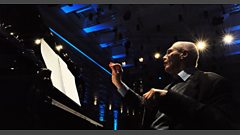Kurtag at 90, Boris Giltburg, Glyndebourne Youth Opera
Tom Service presents a composer portrait of György Kurtág, talks to pianist Boris Giltburg, and visits Glyndebourne Youth Opera.
Last on
More episodes
Previous
Clips
-
![]()
György Kurtág
Duration: 21:33
Chapters
-
Boris Giltburg
Duration: 11:33
Glyndebourne Youth Opera
Duration: 08:47
Composer profile: György Kurtág
Duration: 21:48
Boris Giltburg
![Boris Giltburg]()
Tom talks to the Russian-born Israeli pianist Boris Giltburg, who joins the Royal Scottish National Orchestra in February for concerto and chamber concerts.
Alongside his highly-acclaimed concert performances and recordings of Romantic piano repertoire, Giltburg also blogs about the inner workings of classical music, his aim being to make it "less daunting and complex" to a wide audience. Tom hears the story behind his latest post, in which he presented his own recordings of two chaconnes by Bach and Gubaidulina in a tribute to victims of the Paris attacks last November.Â
More information:
Glyndebourne Youth Opera
![Glyndebourne Youth Opera]()
As Glyndebourne’s education department celebrates its 30th anniversary this year, Glyndebourne Youth Opera prepares for the first performances of Nothing, a new opera based on the Danish author Janne Teller's award-winning book about the meaning of life, with music by David Bruce and a libretto by Glyn Maxwell.
Tom visits rehearsals and talks to the composer, to conductor Sian Edwards and some of the young people involved in the production of this confronting drama.
More information:
Composer profile: György Kurtág
![Composer profile: György Kurtág]()
As György Kurtág turns 90, Tom Service presents a portrait of the Hungarian composer, with contributions from the violinist Patricia Kopatchinskaja, Bálint András Varga, whose published interviews with Kurtág have revealed much about Kurtág's life and music, and Manfred Eicher, the founder of ECM Records who has produced many recordings with the composer.
Kurtág's lifelong obsession for reducing music to small fragments of sound, in a quest for intense musical expression, has produced works such as the still-evolving set of piano pieces ´³Ã¡³Ùé°ì´Ç°ì (Games), which Kurtág and his wife Márta have performed together for over 40 years, and the blistering 40-movement cycle for soprano and violin, Kafka Fragments.
Including an exclusive extract from Kurtág’s forthcoming opera, Endgame, performed this week in Budapest during the composer’s 90th birthday celebrations (by kind permission of Budapest Music Center and Editio Musica Budapest).
More information:
Credits
Role Contributor Presenter Tom Service Interviewed Guest Patricia Kopatchinskaja Interviewed Guest Balint Andras Varga Interviewed Guest Boris Giltburg Interviewed Guest David Bruce Interviewed Guest Sian Edwards Broadcasts
- Sat 20 Feb 2016 12:15Â鶹ԼÅÄ Radio 3
- Mon 22 Feb 2016 22:00Â鶹ԼÅÄ Radio 3
Knock on wood – six stunning wooden concert halls around the world
Steel and concrete can't beat good old wood to produce the best sounds for music.
The evolution of video game music
Tom Service traces the rise of an exciting new genre, from bleeps to responsive scores.
Why music can literally make us lose track of time
Try our psychoacoustic experiment to see how tempo can affect your timekeeping abilities.
Podcast
-
![]()
Music Matters
The stories that matter, the people that matter, the music that matters








